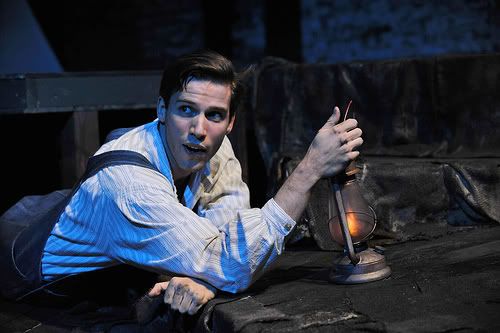Musicals so often stem from the unlikeliest of topics. That the ceaseless plight of Jean Valjean and the bipolarity of a modern day suburban mom became razzmatazz Broadway date-nights shocks me even in retrospect. But not every story adequately fits the playbill. "Floyd Collins,” the folk musical about the real-life cave explorer who, in 1925, became trapped beneath a rock in a Kentucky sand cave, just opened at Theater Wit in a production by Bohemian Theatre Ensemble, and strong musical fodder, "Floyd" is not. Although the show is approached with great reverence and solemn whimsy by book writer Tina Landau and composer Adam Guettel, the work's already underdeveloped ideas are offered no additional clarity by BoHo's klutzy staging. Perhaps an attack on the commercialization of human tragedy or possibly a reaffirmation of unbreakable familial bonds, "Floyd Collins" is a little bit of everything besides, well, a smartly-told, dramatic story of Floyd Collins.
Like so much rejection-of-form theatre, "Floyd Collins" begins as a folksy campfire story, but it quickly retreats to old, more recognizably classic habits. "The Ballad of Floyd Collins," the opening song performed by the entire ensemble, resembles the grand folktales of Paul Bunyan, Johnny Appleseed, or that devil who went down to Georgia, and is sung with similar southern grimness. But shortly after Floyd gets caught in an underground tremor and becomes trapped in the cave, unable to move, the show transitions into your average, uninvolved book musical. The efforts on the surface to rescue Floyd, and the purpose of a fledging sensational reporter/sort-of-narrator, Skeets Miller (Greg Foster), are a jumble, and story's development right up until the nuanced final scene and striking last stage picture, is hackneyed.
Director Peter Marston Sullivan has approximated the claustrophobia of Floyd’s dreary stone imprisonment unintentionally through his overcrowded, optically loud staging that is much too spatially ambitious for the limitations of Theater Wit. The awkward levels of Diane D. Fairchild’s set lack visual dynamism and force most of the above-ground events onto the packed raised partition upstage. That upstage rave is mystifying because while the bulk of Fairchild's design is dominated by a gray, angular cave aesthetic, only a fraction of the literal cave is utilized in the play. The majority of the stage is used for the surface-level scenes. Perhaps “we are all in a cave” or some other psychedelic nonsense, but the effect is drab, colorless, and scenically confusing. Similarly Fairchild’s lighting design is too tightly focussed, and actors' faces are often messily shadowed as they cross the stage.
I did find myself latching onto the score by Adam Guettel. It's earthier and more tuneful than his better-known “The Light In The Piazza,” for which he won the Tony Award, but “Floyd” lacks “Light”s supple narrative prowess and only verges on the former's luscious vocal creativity. The bouncy, upbeat melodies don’t pair so well alongside the disparately thematic plot about a man trapped in a cave, but they exist peaceably as a separate audible entity. For musical theatre geeks, it’s majorly interesting and whole lot of fun to listen to Guettel wrestle, early in his career, with his own innovative musical idiosyncrasies and the more traditional Broadway sound.
Guettel collaborated with Steppenwolf Ensemble Member Tina Landau on “Floyd Collins” during the original 1996 production at Playwrights Horizons. Landau not only wrote the musical’s book, but directed it as well, which leads me to believe that her occasionally asinine dialogue and seeming inability to structure strong relationships among her characters wasn't quite so evident in her own tailor-made production. At Theater Wit, somewhere in the second act, I actually forgot that Nellie (Sarah Bockell) was Floyd's sister and mistakenly misconstrued her as his lover until the very end. There is also a fleeting insinuation that Floyd's father Lee (Russell Alan Rowe) sells out his son when he begins distributing pictures of Floyd to drooling crowds for a dollar. However, that plot deviation is never mentioned again.
Some of the shadowy actors are tremendously expressive and vibrant despite their stone-cold surroundings and choppy material. Jim DeSelm plays Floyd with a youthful vigor that adds another layer of tragedy to his unfortunate predicament – drawing strikingly relevant parallels to the “girl trapped in a well” hysteria of several decades ago. DeSelm sings Floyd with a soft power and his magical call-and-response cave yodeling (my kudos go to Christopher Kriz's kinesthetic sound design) early in the first act is the only time the musical finds a truly unique personality. Jon Harrison's portrayal of Floyd's brother Homer is equally vital and incomparably earnest, and together, Harrison and DeSelm create the play's most touching moments. The remainder of the large fourteen-member ensemble must wrestle with the flat and scattered characterizations and blunt story-lines they've been handed, and are resultantly unmemorable. -Johnny Oleksinski
'Floyd Collins' by Bohemian Theatre Ensemble runs at Theater Wit through July 15.
